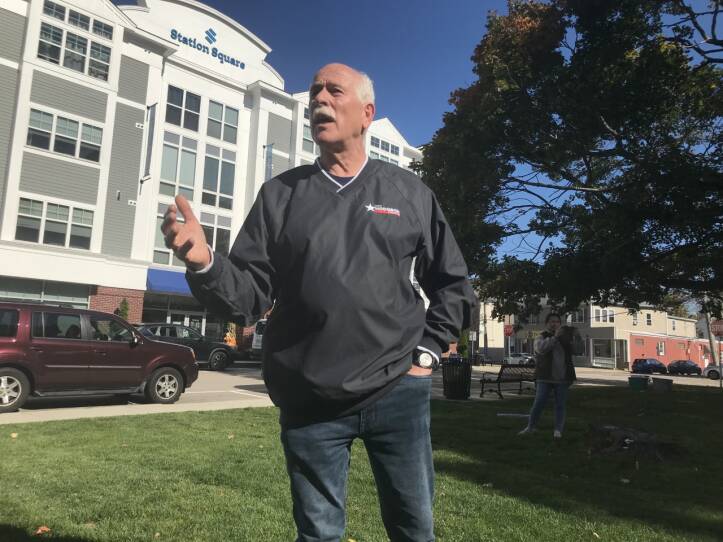Updated Nov. 1 at 5:17 p.m.
Embracing former President Donald Trump doesn’t usually pay off in Massachusetts politics, but the Bristol County Sheriff’s contest may be an exception. Thomas Hodgson, who’s had the job for a quarter century, turned himself into a high-profile Trump ally even before the former president’s inauguration — and he’s sticking with that M.O. as he seeks a fifth full term, casting himself as a bulwark against encroaching leftist decline and disorder.
Hodgson’s Democratic opponent, former state representitive and current Attleboro Mayor Paul Heroux, is taking a different tack: Instead of diving into the culture wars, he’s courting the political center by critiquing Hodgson’s long and checkered record as an administrator. Heroux ousted a longtime Republican incumbent to become mayor in 2017, and Democrats are hoping he can replicate that feat in a few weeks. But given the power of incumbency, the distinctive politics of Bristol County, and Hodgson’s knack for leveraging the conservative id, the margin separating the winner and the loser is likely to be paper thin.
Recently, Hodgson joined about two dozen supporters for a campaign stand-out in downtown Mansfield, just south of Foxboro, where they held "KEEP TOM HODGSON" signs and waved to passing drivers. Around noon, as the event wrapped up, the contingent gathered on Mansfield’s North Common for a pep talk from the candidate, who told them something much bigger than who runs Bristol County’s jails is at stake this election.
“We aren’t going to fall back into this left-wing, sort of socialist idea that the criminals are really the victims — and the true victims, well, you know what? They don’t really exist,” Hodgson said.
More Politics
After citing New York and Philadelphia as places that have succumbed to that mindset, and where criminals now abuse vulnerable citizens with impunity, Hodgson ramped up the rhetoric even more.
“We are all, right now, chosen for this time in history,” he said. “Our kids and our grandkids are going to say of us, ‘My mom and my dad, when America was spiraling downward … they stood up to retain our quality of life, our security in our communities, and the opportunities this great country offers.”

Throughout his 25 years as sheriff, Hodgson has been making it clear that he sees criminals as criminals, full stop.
In 1997, after he was appointed by then-Gov. Bill Weld when the previous sheriff resigned, Hodgson closed the weight room and removed TVs from prisoner cells at the Ash Street Jail, casting the moves as both a matter of principle and a way to reduce recidivism. ("It's about time that people realize that jail is going to be jail and that we don't want you to come back," Hodgson told the Providence Journal-Bulletin.) Hodgson also suspended Alcoholics Anonymous and Bible study programs, though he says that was a temporary interruption made due to disciplinary issues.
The discourse around criminal justice has shifted since then, with more attention paid the social determinants of crime, the built-in biases of law enforcement, and the recognition that many people serving time in correctional facilities have not been convicted of crimes.
But Hodgson’s approach has remained consistent over the years. The facilities he oversees continue to draw criticism and lawsuits, with inmates and advocates citing problems including overcrowding, unsanitary conditions, inappropriate fees, and a lack of access to legal representation. Hodgson, in turn, reiterates that jail is supposed to be unpleasant, and that the best way to avoid that is not to commit a crime.
When Trump was elected in 2016, Hodgson signaled his support in a way that simultaneously boosted his own renown. For example, before Trump's inaugural, Hodgson offered to send inmates from Bristol County to the southern border to build Trump’s much-touted wall with Mexico, a pitch that elicited outrage while also making international headlines.
Hodgson also ramped up cooperation between Bristol County and federal immigration authorities to facilitate the deportation of immigrants living in the country illegally. And in congressional testimony, Hodgson suggested that elected officials in “sanctuary cities” should be arrested — another move that generated ample media coverage. By the midpoint of Trump’s presidency, Hodgson had become a go-to guest for Fox News, which cast him as a voice of conservative sanity in the deep-blue wilderness of Massachusetts.
According to Shannon Jenkins, a political scientist at UMass Dartmouth, Hodgson’s Trump-era star turn coincided with a political shift in Bristol County, which sits south of Boston and east of Providence.
“Bristol County was once strongly Democratic, [including] the strongholds of New Bedford and Fall River,” Jenkins said, referring to the county’s urban anchors. “But over the past couple of election cycles they’ve become increasingly purple, so this area is a very competitive region. … Hodgson has certainly embraced Trump, and I think other voters have followed along with him as he made that move.”
"Bristol County was once strongly Democratic ... but over the past couple of election cycles they've become increasingly purple, so this area is a very competitive region."Shannon Jenkins, political scientist at UMass Dartmouth
Heroux, who worked in corrections for the city of Philadelphia and state of Massachusetts before entering electoral politics, is using a very different strategy as he tries to oust Hodgson. His campaign website is packed with proposals to reform the Bristol County Sheriff’s Office, including subjecting the efficacy of various programs to rigorous analysis; making the results of that analysis publicly available; and professionalizing jail staff through training on topics like implicit bias and deescalation tactics.
Taken in aggregate, those ideas strongly suggest that Heroux sees Hodgson’s approach to criminal justice as dangerously retrograde. But in a recent campaign appearance with U.S. Sen. Ed Markey and other Democrats, Heroux didn’t explicitly make that argument. Instead — after stating that two internal campaign polls show the race is a dead heat, and that he’s raised more money than Hodgson in 2022 — Heroux gave a terse, somewhat technocratic campaign pitch that doubled as a strategy reveal.
“If I get elected sheriff, I won’t be another sheriff for life — maximum two terms,” Heroux said. “That message is resonating with people who are kind of swing voters, so I’m really going after that."
He added that Hodgson has been sheriff "too long" and that, under his leadership, the agency has lost lawsuits and experienced
the highest rate of prisoner suicides in the state

When Markey spoke a few minutes after Hereoux, he struck a different note, describing the Bristol County sheriff's race as part of larger battle — a framing that echoed Hodgson’s own, albeit from the left.
“There’s been a spotlight which has shone on the criminal justice system in our country, and it’s pretty clear that we need somebody who understands that we need mental health treatment put front and center,” Markey said. “We need opioid treatment put front and center. … You have to put in place the kinds of programs that are going to make it possible for these people to have hope.
“This is a criminal justice system on the ballot for a vote,” he added. “How should it be conducted? What kind of person do we want sitting there as the sheriff?”
Afterward, as the small crowd of Democrats dispersed, I asked Markey — like Hodgson, a longtime political survivor — what he makes of Hodgson’s staying power.
“One in three voters in Massachusetts supports Donald Trump — one in three,” Markey said. “People forget that. And in this part of the state it’s even higher… There is a strong Trump underbelly in the state of Massachusetts, and it is something that, when it organizes, can have real political clout.”
The most recent candidate filings list Hodgson with just under $220,000 cash on hand, compared to about $45,000 for Heroux. But Heroux is being boosted by two New York-based super PACs, linked to the
Working Families Party
Hodgson, in contrast, has been boosted by roughly $32,000 in outside spending from the Massachusetts Majority super PAC, which is closely linked to outgoing Republican Gov. Charlie Baker. Baker has endorsed Hodgson, despite the sheriff's enthusastic support for Trumpism and Baker's established aversion to it. In a video posted on Hodgson’s campaign website, Baker calls Hodgson “a guy who’s supported me in every campaign I’ve ever run” and a “strong and loud and honestly relentless” voice for Bristol County residents.
Hodgson and Baker both have ties to the Weld administration. Baker may also appreciate Hodgson’s decision not to join in the attacks directed his way by the increasingly right-wing Mass. GOP. A Hodgson win could also help Baker break his little-known losing streak from backing Heroux’s mayoral opponents in 2017 and 2019.
Whatever the motivation, Baker’s endorsement — and the heft he puts behind it between now and Nov. 8 — could prove decisive in a tight race. In Bristol County, unlike most of Massachusetts, winning as a Trump Republican is possible. But winning as a Trump and Baker Republican might be a bit easier.
Clarification: This story has been updated to provide additional details about, and context for, decisions made by Hodgson at the beginning of his tenure in 1997.








